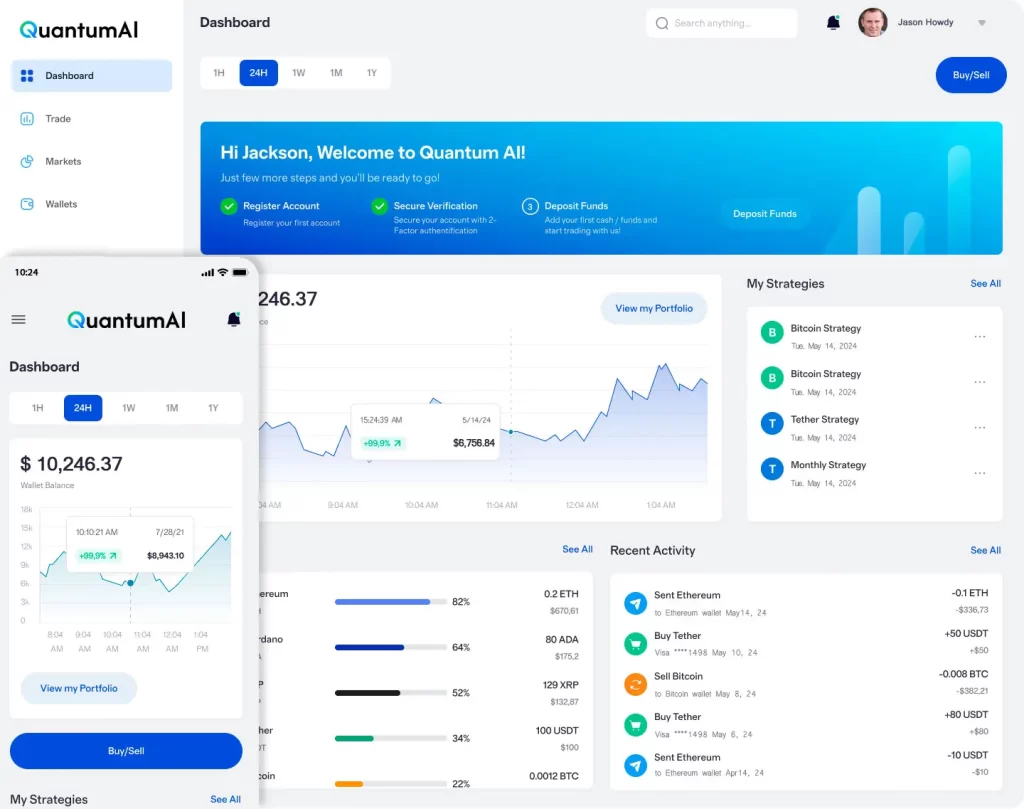Exploring Quantum AI Trading Inspired by Elon Musk’s Technology
In recent years, the financial landscape has witnessed a profound transformation with the advent of Artificial Intelligence (AI) and Quantum Computing. These technologies have revolutionized various industries, and the realm of trading is no exception. One visionary figure at the forefront of this innovation is Elon Musk ” Quantum AI Elon Musk “, whose ventures into AI and quantum mechanics have inspired a new wave of exploration in financial markets. In this article, we delve into the concept of Quantum AI Trading, drawing inspiration from Musk’s pioneering work and exploring its implications for the future of finance.

Understanding Quantum AI Trading:
Quantum AI Trading represents the convergence of quantum computing and artificial intelligence in the realm of financial markets. Traditional trading algorithms rely on classical computing techniques to analyze data and make predictions. However, the exponential growth of data and the increasing complexity of market dynamics have posed significant challenges to conventional methods.
Quantum computing offers a paradigm shift in computational power, leveraging the principles of quantum mechanics to perform complex calculations at speeds unimaginable with classical computers. This capability opens up new possibilities for analyzing vast amounts of financial data and identifying patterns that may elude traditional approaches.
Moreover, AI algorithms enhance the predictive capabilities of quantum systems by continuously learning from market behavior and adapting their strategies accordingly. By integrating AI with quantum computing, traders can develop sophisticated models that not only anticipate market movements but also optimize trading strategies in real time.
Elon Musk’s Influence on Quantum AI Trading:
Elon Musk is renowned for his visionary pursuits across various domains, from space exploration to renewable energy. His ventures into AI, particularly through companies like OpenAI and Tesla, have pushed the boundaries of machine learning and neural networks. Additionally, Musk has shown a keen interest in quantum computing, recognizing its potential to revolutionize multiple industries.
One of Musk’s notable endeavors in the realm of AI is Tesla’s Autopilot feature, which utilizes deep learning algorithms to enable semi-autonomous driving. This application demonstrates Musk’s belief in the transformative power of AI to enhance efficiency and safety in complex systems.
Furthermore, Musk’s involvement in ventures like Neuralink, aimed at developing brain-computer interfaces, underscores his commitment to advancing human-machine symbiosis. While Neuralink’s primary focus is on healthcare and neuroscience, the underlying technology has implications for AI integration and cognitive enhancement, which could extend to financial trading algorithms.
Implications for the Future of Finance:
The integration of quantum computing and AI in trading has the potential to redefine the financial landscape in several ways:
- Enhanced Predictive Capabilities: Quantum AI trading algorithms can analyze vast datasets and identify subtle patterns that influence market trends. This enhanced predictive capability enables traders to make informed decisions with greater accuracy.
- Real-time Adaptability: AI-driven quantum systems can adapt to changing market conditions in real time, adjusting trading strategies accordingly. This agility is crucial in volatile markets where rapid decision-making is paramount.
- Risk Management: By leveraging advanced algorithms, traders can better assess and mitigate risks associated with complex financial instruments. Quantum AI systems can identify potential threats and opportunities with greater precision, minimizing exposure to market fluctuations.
- Market Efficiency: The adoption of Quantum AI trading can lead to increased market efficiency by reducing inefficiencies and enhancing liquidity. As algorithms optimize trading strategies based on real-time data, price discovery mechanisms become more robust.
- Ethical Considerations: As with any disruptive technology, Quantum AI trading raises ethical considerations regarding algorithmic bias, market manipulation, and systemic risks. Regulators and market participants must collaborate to ensure responsible deployment and oversight of these systems.
Also:quantumaielonmusk.co
Conclusion:
The fusion of quantum computing and artificial intelligence is poised to revolutionize the world of finance, offering unprecedented insights and capabilities to traders and investors. Inspired by visionaries like Elon Musk, Quantum AI Trading represents a paradigm shift in how we approach financial markets, with the potential to unlock new opportunities and mitigate risks. As this technology continues to evolve, it is essential to navigate the ethical and regulatory challenges to harness its full potential for the benefit of society. With innovation driving progress, Quantum AI Trading holds the promise of reshaping the future of finance in profound and transformative ways.




